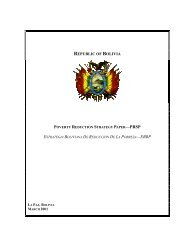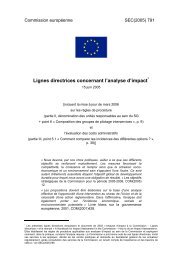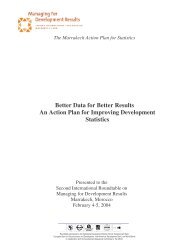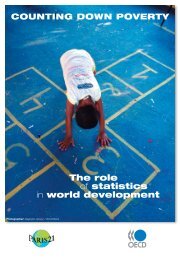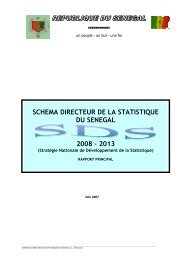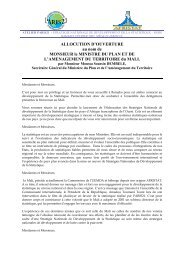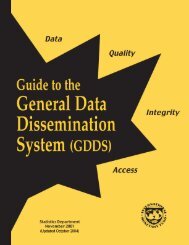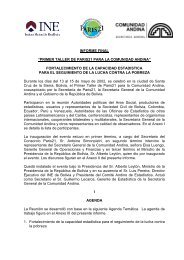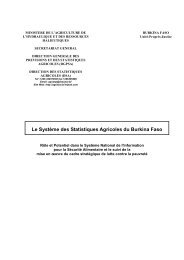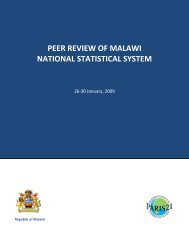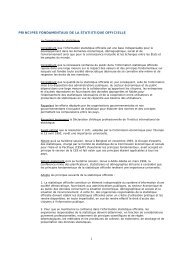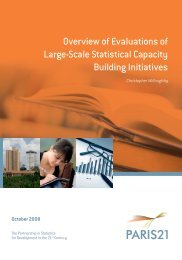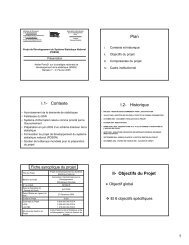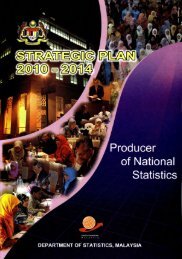Peer Review of Tanzania National Statistical System - Paris21
Peer Review of Tanzania National Statistical System - Paris21
Peer Review of Tanzania National Statistical System - Paris21
You also want an ePaper? Increase the reach of your titles
YUMPU automatically turns print PDFs into web optimized ePapers that Google loves.
<strong>Peer</strong> review <strong>of</strong> <strong>Tanzania</strong> <strong>National</strong> <strong>Statistical</strong> <strong>System</strong>5‐7 September, 2007<br />
formal training at academic institutions and not enough on team building and on the job training.<br />
This is a pan‐African weakness that management would be advised to address.<br />
One concern that the team had was the small size <strong>of</strong> the staff <strong>of</strong> the Bureau, and the rather<br />
unusual mix <strong>of</strong> topics contained in each <strong>of</strong> the four Directorates <strong>of</strong> NBS. The team had mixed<br />
views on increasing the size <strong>of</strong> the establishment, and in particular on the proposals to introduce<br />
more levels into the hierarchy. It is important that the focus remains on the statistical production<br />
process, and that the organisation is not swamped by a hierarchical structure which distances the<br />
teams producing statistical series from the management process. The NBS is an organisation<br />
which is intellectually based, and the focus should be on enabling that intellectual base to<br />
develop and to be motivated.<br />
It was the team’s view that the subject matter Directorates should be more homogenous, to<br />
allow more cross‐fertilisation <strong>of</strong> skills and to aid team building. The exception to this was the<br />
Department <strong>of</strong> <strong>Statistical</strong> Methods and Standards. We felt that this should be a Directorate<br />
reporting directly to the Director General, and should be responsible for auditing <strong>of</strong> data quality<br />
and recommending to the DG that a data release meets quality standards, for which this<br />
department should be responsible for developing. It should be at a higher level than the other<br />
Directorates, as it has the supervisory task <strong>of</strong> ensuring standards are met. The person<br />
responsible for this should have excellent technical skills, and have a team that adequately<br />
reflects the knowledge base required for working with producer statisticians on quality<br />
assurance.<br />
4.5.1 Recommendations on sustainability<br />
16. Seek pr<strong>of</strong>essional advice on developing the organisational structure, and be sparing in<br />
the introduction <strong>of</strong> new hierarchies.<br />
17. Develop team working skills, and seek support on team building and on‐the‐job training<br />
with the view to building teams which are not dependent on one person. This may feel<br />
risky to those passing on their skills, and this should be reflected in performance appraisal<br />
and rewards to ensure that it is a valued activity.<br />
18. Involve pr<strong>of</strong>essional statisticians who will be a potential technical consultant’s<br />
counterpart in developing terms <strong>of</strong> reference with the management.<br />
19. Insist that the consultants submit full metadata and documentation <strong>of</strong> the tasks<br />
undertaken to the quality and standards division, and ensure that this is fully archived.<br />
20. Make time in the working week for seminars discussing methods and techniques with<br />
teams <strong>of</strong> pr<strong>of</strong>essionals<br />
21. Raise the status <strong>of</strong> the Methods and Standards department to report directly to the DG<br />
and ensure that it is well staffed with pr<strong>of</strong>essional experts.<br />
22



